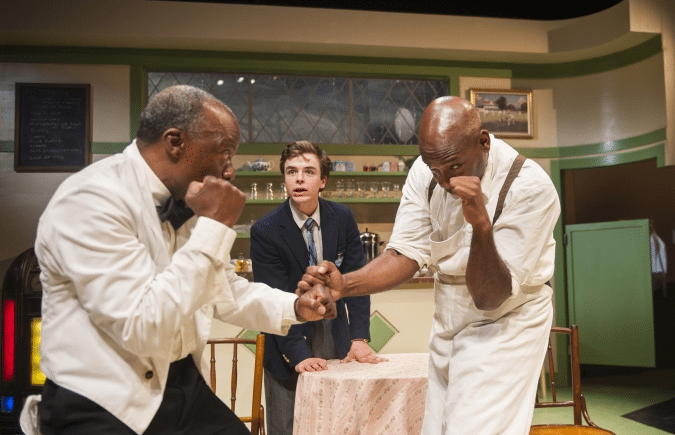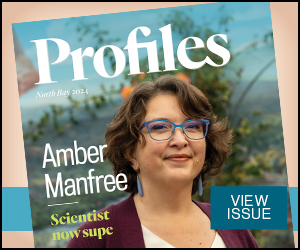By Charles Brousse
When the packed house at Berkeley’s Aurora Mainstage Theatre rose as one and clapped, cheered and whistled at the conclusion of last week’s Opening Night performance of Master Harold … and the Boys, it was a demonstration of the power that Athol Fugard’s drama still retains even though South Africa and the world have changed significantly since the play’s 1982 premiere at Yale Rep. Part of the credit rests with Fugard’s eloquent, multi-layered script, part with the passion and craft that the Aurora’s three-actor cast, ably directed by Timothy Near, bring to it. Whatever the ratio of their contributions, the result is 90 uninterrupted minutes of vivid, memorable theater.
It’s 1950, about midway in the apartheid era that began near the turn of the century and formally ended in 1994. The setting: A working class tea shop (nicely rendered by designer Richard Olmsted) in the white sector of Port Elizabeth. Taking advantage of the fact that heavy rain has kept the customers away, the middle-aged black service “boys” while away the time talking about an upcoming ballroom dance contest in their home township. Sam (L. Peter Callender, forceful as only he can be) urges his younger work mate to view dance as an art form that benefits the participants and helps to bring order to a chaotic world; Willie (a solid Adrian Roberts) reluctantly tries to emulate Sam’s expert demonstrations of ballroom style, but is discouraged by his awkwardness and worries that Hilda, his dance partner/girlfriend, may not show up for the competition because of a beating he recently administered when she didn’t follow his instructions—to which Sam, aware that a previous relationship ended similarly, gently suggests that Willie might consider not beating the women in his life.
At first, the jovial atmosphere continues after the arrival of Hally (Andrew Humann, in a finely detailed portrayal), the 18-year-old son of the tea shop owner.
Ever since boyhood, Sam has been a kind of surrogate uncle to Hally, counseling him in his studies, helping him to build and fly a kite and generally standing by him when his alcoholic father was unable to function. During this period, race was never an issue. Lately, however, the constant tension between father and son has begun to wear on Hally, causing him to lose interest in school and life in general.
A phone call from his mother informing him that his father insists on returning home early from the hospital after his most recent treatment sends him over the top. Venting his frustration, he lashes out at the two men who have served his family so well for many years, allowing a small incident to ignite a fire that in an instant threatens to consume all the good will that has bound the three of them together. No longer are they to call him Hally; no longer are they equals as human beings. From that point on, it must be “Master Harold” and they must show appropriate deference, a shift that promises bleak consequences as the play hurtles toward an unpredictable conclusion.
But Fugard, ever the optimist, will not let go of his belief in the essential goodness of his characters. Like Anne Frank as she hears the Nazi boots approaching her Amsterdam attic, he clings to the dream that somehow, someday, people will get it right.
Master Harold … and the Boys is one of the 20th century’s greatest works for the stage, and Athol Fugard, white though he might be, is Africa’s most respected modern voice. Aurora’s brilliant revival should educate the unknowing, quiet the skeptics (if there are any) and remind the rest of us what a wonderfully useful instrument live theater can be in illuminating the issues of our times.
NOW PLAYING Master Harold … and the Boys runs through July 17 at the Aurora Theatre Company, 2081 Addison St., Berkeley; 510/843-4822; auroratheatre.org.












